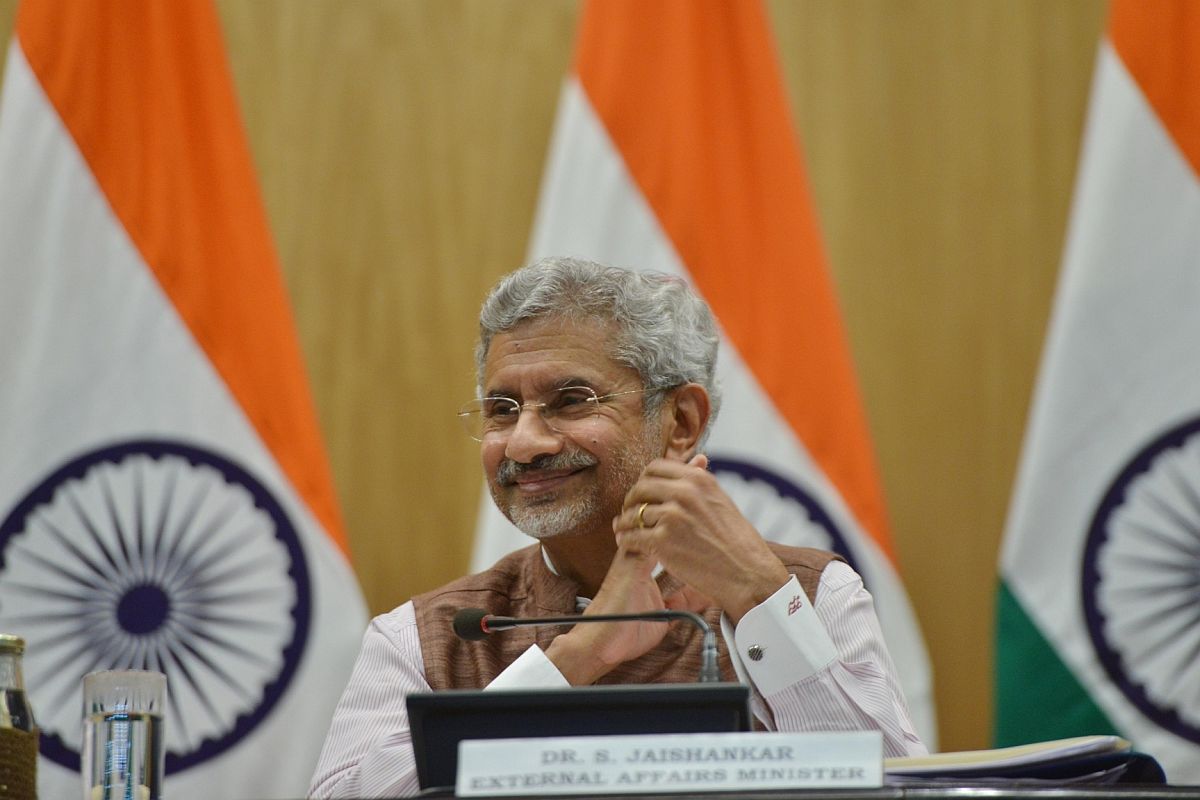Cong defeated ‘Bangladesh’ in semis, will rout ‘Pakistan’ in finals: Reddy
Reddy was addressing a meeting of the Congress social media team and took digs at both the BJP and the BRS.
According to Jaishankar, reactions which came after abrogation of Article 370 were obvious, and India’s strategy is to make people understand why all of this is for their long-term benefit.

External Affairs Minister S Jaishankar. (Photo: IANS)
External Affairs Minister S Jaishankar on Wednesday described the decision to abrogate Article 370 in Jammu and Kashmir as a “long-awaited” step and the “right thing” to do and that it was expected that Pakistan instrumental in fueling terrorism and separatism in Kashmir would challenge the decision.
Foreign Minister on a three day visit to US, was interacting with the Washington audience. He said, “What we’ve done, was long awaited. In my view, it was the right thing to have been done. It should have been done many years earlier.”
“At the moment, given the fact that there have been such deep investments made by Pakistan in Kashmir, both in terrorism and in a kind of separatism… we don’t expect this to be uncontested,” the Foreign Minister said at an event organized by a top American think tank, The Heritage Foundation.
Advertisement
Jaishankar said that Pakistan have been was fully expected to paint “apocalyptic scenarios” as had been its MO for several decades, but the Indian security forces had exercised the highest degree of restraint in Jammu and Kashmir after August 5 (when the decision to scrap Article 370 was announced).
“What do you expect the Pakistanis to say (after current restrictions are lifted and normalcy is restored)… we expect calm and happiness to return? No, they (Pakistan) will not. They will paint apocalyptic scenarios because one, that is their wish and two, that’s actually what their game plan has been for 70 years,” he said.
In response to a query on recent remarks by a Pakistani politician alleging that India would blame Islamabad for any terrorist attack after the security and communication restrictions were lifted in Kashmir, Jaishankar said, “I think it’s important to have a historical context to judge these remarks. This is not a conversation that began on August 5. These are their policies and their actions which began the day Kashmir acceded to India with Pakistani invaders threatening to burn down Srinagar. Please look at the history of Kashmir.”
As such there is a lot out there which needs to be taken into account, he said, noting that India’s endeavour will be to “manage this as well as it can”.
“I’m reasonably confident we should succeed out there. We have also seen a lot of alarmist rhetoric coming (from Pakistan), not just about false flag, (but also) jihad… going all the way to nuclear weapons. That kind of gives you a sense of responsibility of the people who are saying,” the minister said.
On question of Pakistan Occupied Kashmir (PoK) and India’s action plan on getting back PoK, Jaishankar said it was under illegal occupation of Pakistan.
“The point I was making was a very simple one. My sovereignty and my jurisdiction is laid out by my maps. My maps have been there for 70 years. That’s my claim. And naturally, if I have a claim, as you would have a claim, as anybody would have a claim, we would hope one day that if there are territories in your claim of which you don’t have physical jurisdiction one day, you will. It’s as simple as that,” Mr Jaishankar said.
According to Jaishankar, reactions which came after abrogation of Article 370 were obvious, and India’s strategy is to make people understand why all of this is for their long-term benefit.
“Clearly our intention is that they would buy into that”, so that there is likely success of this new policy, he said.
Jaishankar also told the audience that India will take all necessary precautions in the interim period because history has shown the need for precautions adding that instructions given to the security forces have been to exercise extreme restraint.
The government will fail in its duty if it does not take that call, the Foreign Minister said.
Earlier, on Tuesday S Jaishankar said that once India triggers development in Jammu and Kashmir, all of Pakistan’s plans for the last 70 years against the state would come to an end and that there are “vested interests” built over 70 years – local vested interests as well as vested interests across the border.
“If we manage to get development in Kashmir, everything Pakistan planned for the last 70 years comes to naught; it’s not something they are going to let happen easily,” he added.
Last month, Jaishankar had said that India has no problem talking to Pakistan, but it has a problem talking to “Terroristan”.
Last month, Jammu and Kashmir Governor Satya Pal Malik had also highlighted this when he said, “If we are able to take Jammu and Kashmir to the path of development, which is very much possible, the day is not far when the PoK residents, facing the worst situations under the occupation of Pakistan, will race towards us on their own.”
India is leaving no stone unturned to thwart attempts by Pakistan to internationalise the Kashmir issue at all the international forums be it at the UN or any other forum.
India has categorically told the international community that the scrapping of Article 370 to revoke the special status of Jammu and Kashmir was an internal matter and also advised Pakistan to accept the reality.
Tensions have been simmering between India and Pakistan ever since the Centre on August 5 revoked Article 370 of its Constitution that gave special status to Jammu and Kashmir and divided it into two Union Territories – Jammu and Kashmir and Ladakh.
Advertisement